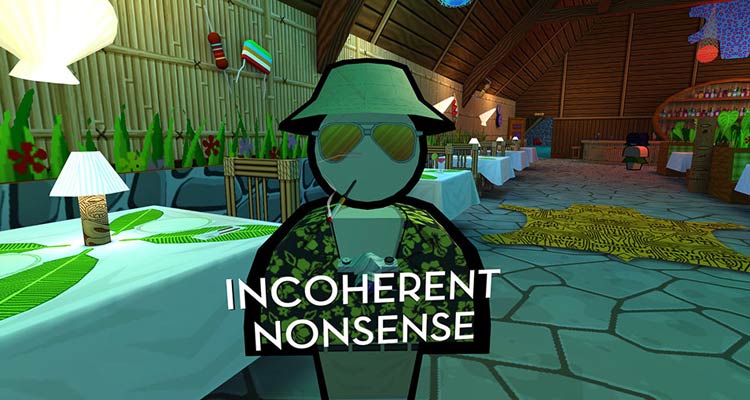Spies, trench coats, Soviets, and robotic hotel clerks? This is the absurd world of Jazzpunk.
Last year saw the release of notable games such as Gone Home, The Stanley Parable, and Proteus, games which some people ignorantly referred to as “non-games”. Such a derogatory term is inapplicable as it suggests that in order for something to be classed as a video game requires there to be competition enabled via a rules based system which dictates what takes place in a game. As opposed to aimlessly wandering around in Proteus or leisurely exploring the characters residence in Gone Home.
Jazzpunk might not catch the attention of those denouncing certain titles with the term “non-games”, but it shares the same sense of individual exploration and provides plenty for the player to discover. Which is certainly the core feature of the game; as if one were to only follow the instructions they would miss a sizeable portion of the game. The Stanley Parable plays around with the concept of choice, and whilst Jazzpunk does not impose the same level of freedom, it does encourage the player to explore at their own pace and in their own order.
In terms of functionality Jazzpunk is essentially an adventure game operating in a similar vein to that of a point and click game. With most tasks boiling down to talking to one person, obtaining a unique object, and then using said object elsewhere. Except the process is more streamlined than found in most point and click games (including those made by Telltale Games). These make up the main activity of the core objectives of the “missions” which each begin by taking the appropriately titled medicine Missionoyl. Although this only provides a brief explanation of the bizarre activities that take place throughout Jazzpunk.
Jazzpunk is all about jokes, with some calling it a ‘comedy adventure game’, which is not an inappropriate title. The game bombards the player with jokes and gags, yet these never get old. Jokes are rarely repeated, and are used correctly when they are. This is evident with the games obsession with computer related puns; ‘I’ve got some upcoming gigs, almost a terabyte’, to openly mocking the structure of games, ‘Do you have the mcguffin?’ A number of the gags take the form of minigames which are often parodies of existing games such as Frogger and Street Fighter. Then there are novel reimaginings of Quake and Wave Race 64 that the player will also come across. On top of this are the other random challenges that the player might come across, including a game of Twister. These help to break up the main pace and add significant variation to the game. Leaving the player wondering what activity they might find themselves partaking in next.
In addition to the numerous video game references are notable nods to films including Fear And Loathing In Las Vegas and Blade Runner. Yet these are used as stylistic additions rather than dictating the presentation or the actions of a level. They never get in the way or take over from the prevailing themes of Jazzpunk. This is because the game is competent in creating its own cast of crazy characters, such as the Scottish/Hawaiian hotel owner who ‘only speak[s] sockpuppet’ and the absurd events which permeate throughout the game.
A game like Retro City Rampage relies heavily on the assumption that the player understands the references being thrown at them, which are used to define the experience that is being provided, preventing it from having its own unique identity. Whereas Jazzpunk is always aware of how its use of references might be interpreted, knowing that not everyone will get the reference, therefore it needs to be funny in its own right instead of just being a placard screaming “reference”.
It is because of this that despite its craziness everything is cohesive and makes sense in its own special way, nothing feels out of place. This is surprising considering in one mission the player is at a beach resort talking to a Fear and Loathing esque Johnny Depp to another where they are traveling around a villain’s penthouse in hover cars. The key is that Jazzpunk never forgets that ultimately it is a game about a spy conducting international espionage in an alternative Cold War setting, keeping it as grounded as possible for such an absurd title. This level-headedness to its core theme is reflected in its length. The game can be finished in just a few hours (slightly longer if one wishes to obtain all of the achievements), yet this feels like the perfect length as it does not outstay its welcome, nor does it feel like the game has been rushed (providing the player does not just run through the main objectives). The advantage of the length is that it allows for replayability in the same sense that certain films are rewatchable.










This looks like a breath of fresh air, humour in games is rare enough, but good humour is like gold dust. Looks a treat visually too.
Unfortunately I didn’t give much attention to the visuals, although the images kind of do that job for me. Also the game is a technical achievement as even on a graphically low powered laptop the game still looks and runs great.